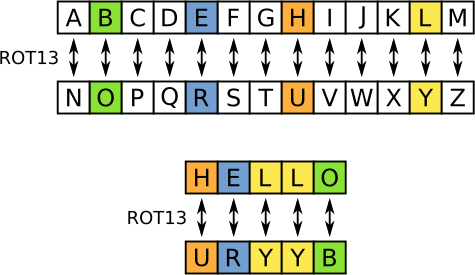No wade, I said it had nothing to do with "
enciphering!" Ciphering, deciphering and
enciphering are three different things, but you knew this, right?
To decipher, which basically means "to make out the meaning of something" only pertains to
ciphers when used within that context, but in the context of languages it is pretty much synonymous with "translating." Hence, it isn't really surprising nor is it inappropriate that the Rosetta Stone is said to help us "decipher" the Egyptian language.
As I pointed out before, ciphers are only ciphers when a "cipher key" exists. A cipher key is basically a system of deciphering a code that once known, makes it easy for anyone to decipher a hidden message. Any enciphering project first begins with the development of a cipher key. Will illustrated how this works with Masonic ciphers. Once you saw the systematic removal or addition of a side or dot in a cube, you could easily figure out what each represented. Likewise, in your previous example of the ROT13 cipher, all one needed to do was understand the cipher key, which is essentially this:

In another example of a common cipher, the Caesar cipher essentially scoots down each letter three spaces, so the cipher key would be something like:

The KEP provides nothing that could reasonably be understood as a "cipher key," by which all future encoding could be deciphered. On the contrary, the thing took on multiple levels of "parts" and "degrees" that made every little dot and slash take on meanings consisting of not only multiple words, but also multiple sentences. Nudge a slash by a fraction of a degree and suddenly the "meaning" becomes a different sentence entirely. Will doesn't share any of this with his listeners because he knows that once they understand this, his chances of successfully selling the "enciphering" theory, take a nosedive south. The idea of enciphering would be ludicrous to anyone familiar with how ciphers worked, and the early Mormons, most of whom were familar with Masonry, were entirely familiar with how they worked. So to suggest they were so ignorant of ciphers that they engaged in enciphering before realizing their "system" was too complex for practical usage, thus they all threw their hands up and said "to hell with this," is just another reason why Will's is a weak theory. It relies on too many implausible scenarios.
Moreover, Ciphers do not have an "alphabet" let alone a "grammar," nor do they typically involve "sounds." You might find a couple of examples where some groups over the span of a few thousand years decided to attribute sounds to cipher symbols, but these are exceptions, not the rule. And before you can be taken seriously, you still have to explain why an "alphabet and grammar" are better explained as cipher and not language! Your claim that languages and ciphers synonymous is ridiculous. They aren't synonymous. A cipher is a means by which a language is kept hidden from others who understand said language. Portuguese and English are languages. I can decipher Portuguese into English but this doesn't mean Portuguese was designed to keep secret things that were written in English. And I couldn't use a simple "cipher key" to translate Portuguese. Instead, I'd have to actually learn the "alphabet and grammar" of that language, along with all its distinctive phonetics. I laugh every time my football players from Brazil try using Google translator to send me messages in English. Half the time they end up sending messages saying the opposite of that which they are trying to convey. It simply doesn't work as well as it should because languages are far more complex than ciphers, and everything about the KEP reeks of complexity. The "English explanations" present in the KEP smack of translation, not enciphering. For instance, a cipher wouldn't "explain" the symbol representing 19 as "ten and nine." That sounds more like a literal translation from one language to another. In fact, that is
precisely how we literally translate "nineteen" in Portuguese, which is dezenove.
dez = 10
e = and
nove = 9
In a cipher there is no reason to call 19, "ten and nine." You'd keep it short and simple as "nineteen." But Joseph Smith's explanation as "ten and nine" makes it perfectly clear to language professors that he was
translating (or
deciphering if you prefer) from one language, not
enciphering into a code.
On the whole, sounds within ciphers were very rare. But why even go down that bunny trail when we already know that "alphabet/grammar/phonetics," all three of these elements best fit within the model of translating one language to another? The fact that Joseph Smith repeatedly claimed to be "translating" (i.e deciphering) documents during this project is enough to refute the enciphering theory and go with the translation theory. Will's theory is the weakest explanation from every possible angle.

